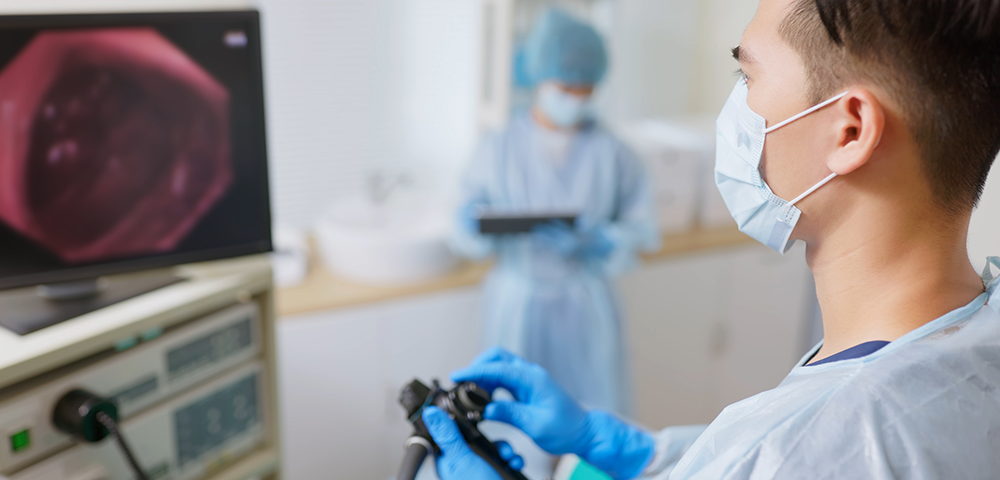Colorectal cancer is the third most common cancer diagnosed in the United States. About 4% of Americans will be diagnosed with colorectal cancer at some point in their lives. Colorectal cancer is second only to lung cancer for the number of deaths associated with it. But if caught early enough, the survival rate for colorectal cancer is greater than 90%. Colorectal cancer begins in the colon or the rectum and can over time develop from noncancerous polyps.
Understanding the early warning signs, such as changes in bowel habits, rectal bleeding, and abdominal discomfort, is crucial for early detection and successful treatment.
Warning Signs
Colorectal cancer often starts as small growths called polyps in the intestine. While polyps are usually harmless and don’t cause symptoms, some can develop into cancer. They are typically found and removed during a colonoscopy.
As cancer advances, symptoms may appear, including:
- Anemia
- Abdominal discomfort
- Bloating
- Changes in appetite or bowel movements
- Frequent diarrhea or constipation
- Pain during bowel movements
- Blood in the stool or rectal bleeding
- Feeling of incomplete bowel evacuation
- Unexplained weight loss
These symptoms don’t always mean colorectal cancer, but if you notice any, schedule an appointment with your doctor promptly.
Screening and Diagnosis
Current recommendations suggest people should be screened for colorectal cancer starting at 45 years for those considered to have an average risk. People who are at a higher risk of developing colorectal cancer should be screened earlier. The timing of when screenings should begin will depend on the risk factors for the individual.
Factors that increase the risk of developing this cancer include:
- Family history of colorectal cancer
- Genetic conditions such as Lynch syndrome
- Inflammatory bowel disease, ulcerative colitis, or Crohn’s disease
Screening for colorectal cancer may include a Fecal Immunochemical Test (FIT), colonoscopy, flexible sigmoidoscopy, or CT colonography.
- A FIT uses antibodies to detect blood in the stool.
- A colonoscopy allows a gastroenterologist to see inside the entire colon, remove polyps, and perform biopsies of concerning areas.
- A flexible sigmoidoscopy is like a colonoscopy but only examines the rectum and lower part of the colon.
- A gastroenterologist may also use CT colonography, which is a non-invasive imaging test using CT scans to visualize the colon. However, this test frequently is not covered by insurance plans and sometimes requires a follow-up colonoscopy for any abnormalities found.
Prevention
You can take steps right now to begin to lower your risk of any form of cancer. While these steps are not guaranteed to prevent colorectal or other types of cancer, they can improve your odds:
- Quit smoking
- Avoid alcohol
- Eat a healthy diet
- Exercise regularly
- Get regular medical check-ups
Treatment
Surgery is the most common treatment for colorectal cancer if the disease is caught early enough. This may require surgical removal of cancerous tissues.
Chemotherapy is frequently used alongside surgery, or on its own to treat colorectal cancer. Chemotherapy is usually used for more advanced stages of cancer. This involves using drugs to prevent the cancer from spreading or to kill it outright. Chemotherapy may also be done before surgery to shrink tumors, or afterward to reduce the odds of recurrence.
Radiation therapy uses powerful X-rays or other radiation to stop cancer cells from growing further or to eliminate them. Radiation therapy is more often used to treat rectal cancer. It may also be used in combination with chemotherapy to improve effectiveness in stopping cancer.
Advanced Targeted therapy uses monoclonal antibodies to target specific proteins or genes unique to cancer cells to slow their growth or kill them. This kind of treatment is often used in combination with other treatments.
Immunotherapy is another option to fight cancer. This uses drugs to strengthen the immune system to better respond to the cancer. There are several forms of immunotherapy for cancer. The type chosen depends upon the form and stage of cancer.
Cancer can be a frightening thought for anyone, but there is help and hope available. If you think you may have colorectal cancer or have already been diagnosed, it’s important to see a doctor right away. Schedule an appointment with one of Lexington Clinic’s board-certified gastroenterologists. Early detection and treatment are key—delaying care can allow the cancer to spread, which can lower the chances of survival.

About An-Yu Chen, MD
Dr. Chen is board-certified in Gastroenterology and Internal Medicine. Current Head of Section in Gastroenterology. He offers a wide range of services, including small bowel capsule endoscopy (Pillcam); colonoscopy, EGD with argon plasma coagulation, ERCP, liver disease care and treatment of GERD, IBD, IBS, peptic ulcers, celiac disease and more.
For more information on Dr. Chen, call (859) 258-4950 or visit LexingtonClinic.com.







